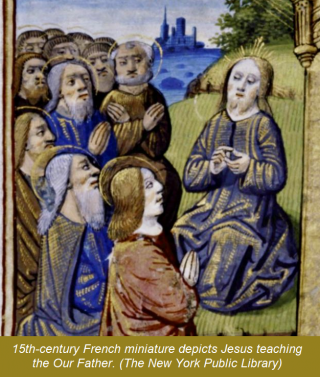Rev. Kurt Hering’s objective is to make a connection between the “Gospel Text For The Day” (usually) and the Book of Concord in order to help pastors make connections for their parishoners that help them understand how the BoC sets forth the faith once delivered to us in Scripture for the life of the Church. The vast majority of Lutherans simply have never had that done for them, largely because a pastor only has so much time for a sermon and getting everything ready for Sunday in addition to his weekly work with Christ’s sheep.
(You may download a letter size pdf file Sixth Sunday of Easter (Rogate) Bulletin Insert from this link.)
There is no better or more complete prayer for the Christian to pray than the Lord’s Prayer, for by it our Lord Jesus Christ teaches us the “whatever” we are to ask for in His name. [Rev. Kurt Hering]

A READING FROM THE BOOK OF CONCORD
ROGATE: EASTER 6
GOSPEL LESSON: John 16:23–30
THE LARGE CATECHISM
PART III: THE LORD’S PRAYER
19] . . . we should be the more urged and incited to pray because God has also added a promise, and declared that it shall surely be done to us as we pray, as He says Ps. 50:15: Call upon Me in the day of trouble: I will deliver thee. And Christ in the Gospel of St. Matthew 7:7: Ask, and it shall be given you. For every one that asketh receiveth. 20] Such promises ought certainly to encourage and kindle our hearts to pray with pleasure and delight, since He testifies with His [own] word that our prayer is heartily pleasing to Him, moreover, that it shall assuredly be heard and granted, in order that we may not despise it or think lightly of it, and pray at a venture.
21] This you can hold up to Him and say: Here I come, dear Father, and pray, not of my own purpose nor upon my own worthiness, but at Thy commandment and promise, which cannot fail or deceive me. Whoever, therefore, does not believe this promise must know again that he excites God to anger as a person who most highly dishonors Him and reproaches Him with falsehood.
22] Besides this, we should be incited and drawn to prayer because in addition to this commandment and promise God anticipates us, and Himself arranges the words and form of prayer for us, and places them upon our lips as to how and what we should pray, that we may see how heartily He pities us in our distress, and may never doubt that such prayer is pleasing to Him and shall certainly be answered; which [the Lord’s Prayer] is a great advantage indeed over all other prayers that we might compose ourselves. 23] For in them the conscience would ever be in doubt and say: I have prayed, but who knows how it pleases Him, or whether I have hit upon the right proportions and form? Hence there is no nobler prayer to be found upon earth than the Lord’s Prayer which we daily pray, because it has this excellent testimony, that God loves to hear it, which we ought not to surrender for all the riches of the world.